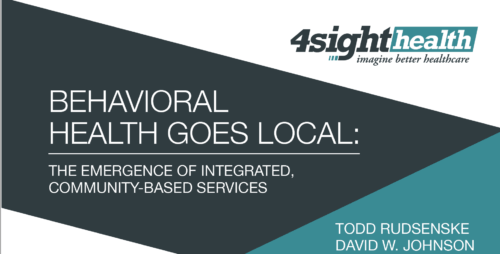November 29, 2016

Behavioral Health Goes Local: The Emergence of Integrated, Community-Based Services
by Todd Rudsenske and David W. Johnson
From addiction to depression to psychosis, mental illness exacts a growing toll on individuals, families, communities and health systems. We can measure its effects in unnecessary deaths, social isolation, reduced productivity and high costs.
Historically, American healthcare has under-invested in mental health services. Inpatient treatment centers are overwhelmed, designed for crisis intervention and not well-positioned for either early disease identification or ongoing maintenance care.
Despite significant co-morbidities, there is minimal coordination between behavioral healthcare providers and acute care providers. Fragmented care is the rule. Integrated care is the exception.
Holistic, integrated care is better for patients, more cost-effective and less subject to catastrophic failure (i.e. unnecessary death or injury). Private equity investors understand this. They’re increasingly directing funds into effective, accessible behavioral health services with the goal of integrating their organizations within the healthcare ecosystem.
New companies and business models are emerging to provide access to community-based services desperately needed by patients. This bottom-up, market-driven movement is rapidly changing the historical approach to delivering behavioral healthcare services by augmenting inpatient care with convenient, coordinated and connected locally-delivered services.
Market-based reform is driving American healthcare toward value. In behavioral health, this translates into better preventive care, better maintenance care and healthier patients.

Behavioral Health’s Unacceptable Status Quo
Mental illness affects nearly 20% of all adults in the U.S. annually. More than 60% of those individuals do not receive treatment for their disorders. This creates a massive drain on healthcare resources and a heavy burden on social services, communities, families, and workplaces.
Mental illness exacerbates costly chronic conditions, such as diabetes, cardiovascular disease and obesity. It triggers unhealthy eating, a sedentary lifestyle, substance abuse (particularly alcohol, tobacco and opiate addiction), higher incidences of incarceration and reduced productivity in the workplace.
Compounding those problems, people with mental health issues are less likely to adhere to prescribed treatments, have a higher risk of adverse health outcomes and are more likely to require hospital readmission and prolonged stays[1]. Individuals with serious mental illnesses even die on average 25 years younger than the general population, largely because their physical health needs are insufficiently addressed.
This disturbing picture is emblematic of a fragmented healthcare system that treats physical symptoms while neglecting root behavioral and social causes of disease. It fails to coordinate care across settings, and lacks accountability for outcomes. As a result, the American people suffer undue harm.
An Improving Landscape
Constructive regulatory and legislative changes are improving the payment environment for behavioral health services. The 2008 Mental Health Parity and Addiction Equity Act, the Medicare Improvements for Patients and Providers Act (MIPPA) and the Affordable Care Act (ACA) have expanded mental health benefits, reduced discrimination against mental health patients and improved access to mental health services.
At the same time, the transition to value-based payment models is incentivizing providers to manage total costs and improve health outcomes. By necessity, achieving better outcomes requires providers to address behavioral and social determinants of health.
Knowledge is power. Mental illness carries less social stigma today. Advocacy groups have increased awareness. Clinicians better understand the correlations between mental illness and disease. Patients seek behavioral services openly and directly.
The business case for holistic, integrated behavioral healthcare is compelling. Each $1 spent on depression and substance abuse saves $7 in related healthcare spending. Overall, greater behavioral healthcare coordination would generate $26 to $48 billion annually in cost savings.[2]
As a result, the market is moving toward a system in which traditional providers and community-wide facilities work together to treat mental health needs with appropriate balance between prevention, maintenance, and treatment.

Straining Mental Health Infrastructure
The downside to reduced stigmatization, enhanced healthcare coverage and better clinical awareness is increased demand for behavioral services and overwhelmed mental health facilities. The growing shortage of mental health services and professionals is especially problematic in smaller cities and rural communities.
Acute inpatient facilities are overburdened and can’t accommodate current service demands. Moreover, the inpatient service model is not equipped to provide preventive or maintenance services. Given this service orientation, hospitals and primary care doctors stabilize physical symptoms, prescribe medications, and discharge patients after a fixed number of days.
In part, the opioid epidemic is a by-product of excessive distribution of pain-killing drugs without an assessment of a patient’s predisposition to addiction and limited or no follow-up care.
Disconnection between payment models and patient needs is the root cause of this systematic dysfunction. There’s ample reimbursement for acute interventions, but not for disease prevention nor care maintenance. Without care coordination, too many patients ping-pong through the system, often ending up back in acute care facilities with serious and expensive care needs.

Thinking Differently
Given the increasing demand for behavioral health services, it’s logical to extend the reach of existing behavioral health networks through easily accessible, community-based outpatient facilities. Clinicians treat less-acute patients in outpatient settings and transition them to acute inpatient facilities only when necessary.
Community-based care is less costly for payers and more efficient for providers. It engages patients who benefit most from locally-delivered treatment sessions. Patient engagement is a leading indicator of success in treating behavioral health. For example, the one-year sobriety rate for patients who receive ongoing outpatient treatment is much higher than for a patient who does not.
Local centers get to know their patients better when they treat them on good days and bad. Local clinicians understand the clinical benefits of matching targeted treatments with patient needs. Patients battling depression, bipolar disorders, drug addiction and various forms of mental and emotional trauma recover faster and relapse less when receiving ongoing care.
Accordingly, payers are authorizing more outpatient treatment days and more follow-up community-based care. “Overtreating” mental illness in acute facilities creates inconvenience, higher costs and harms some patients unnecessarily.
Leading systems, particularly those taking capitated payments, are exploring integrated delivery models and coordinating care among acute and post-acute providers. They are adopting technologies that facilitate coordination, patient engagement and virtual therapies.
The benefits are clear. Engaged patients seek treatment earlier and avoid relapses when receiving the right care at the right time in the right facilities. Outcomes are better. Costs are lower. Patients are happier and more productive. 
The New Innovators
Across the spectrum of behavioral health stakeholders, innovative health systems, insurers, community-based providers, and digital health companies are experimenting with new business models and services.
Specialty Managed Behavioral Healthcare Payer Providers
Molina Healthcare provides health insurance and integrated care delivery to Medicare, Medicaid and commercial patients in 15 states. Molina’s low-cost, outcomes-focused business model supports profitable health plans on public exchanges, a rare feat.
In 2015, Molina Healthcare acquired Providence Human Services and renamed it Pathways. Today Pathways is the nation’s largest national provider of behavioral health services.
Rather than operate high-cost treatment facilities, Pathways treats complex patients with chronic conditions and mental health challenges in their homes and/or community centers. Pathways enables Molina Healthcare to integrate mental and physical healthcare services within a holistic delivery platform.
Beacon Health Strategies provides mental health and substance abuse programs for commercial, Medicaid and Medicare populations. It employs a unique strategy to integrate behavioral health solutions with co-morbidity care to improve patient outcomes and lower overall costs.
Magellan Health Services (MGLN) provides managed behavioral healthcare services, including outpatient and intermediate care programs and inpatient treatment and crisis prevention services, and connects that with physical, pharmaceutical and social services to meet the holistic care needs of the patient.
Magellan collaborates with healthcare purchasers to offer comprehensive, integrated programs that address behavioral health needs across the entire continuum of care.
New Provider Models
Banner Health’s behavioral health hospital in Scottsdale, Arizona, features a new center developed to divert patients from emergency departments where they would linger without proper assessment and care. Banner Behavioral Health Hospital (BBHH) CEO Brian Beutin says that Banner’s strategy is to improve the care continuum for behavioral health patients by reducing the fragmentation of services.
To that end, Banner is building collaborative partnerships with community-based organizations. Community providers now come to the BBHH to assist patients not requiring an inpatient intervention. “We’re not creating a new health system model,” Beutin says, “but we are linking services together to give patients access to behavioral healthcare that’s more effective, less expensive and closer to home.”
Banner is expanding its holistic patient care model by making behavioral health clinicians available at primary care facilities and by providing access to behavioral health services through a user-friendly telemedicine platform. The Early Psychosis Intervention Center (EPICenter) at Banner University Medicine Whole Health Clinic also provides specialized, phase-specific treatment for people at the early stages of a psychotic illness to maximize engagement, alleviate symptoms, and help those patients return to the community sooner.
Community-Based Providers
Pyramid Healthcare provides mental health, addiction and substance abuse services to adults and teens in Pennsylvania. Through its High Focus Centers, it is also the largest provider of structured outpatient substance abuse and psychiatric treatment programs serving adults, adolescents and their families in New Jersey.
CEO Jonathan Wolf believes that “access and speed are essential in treating patients with substance abuse, addiction and mental health needs.” To enhance access and timely interventions, Pyramid operates call centers that handle approximately 250,000 annual calls; deploys 24-hour mobile teams to Emergency Departments; offers low-key access through websites and social media platforms; and partners with hospitals, outpatient services, social workers and the criminal justice system.
“Successful treatment requires engagement,” according to Wolf. “We need to be welcoming and supportive in the services we provide and get patients who need that care to stay in treatment.”
BayMark Health Services with operations across 9 states, focuses on medication-assistance and counseling services in the treatment of opioid addiction. BayMark emphasizes frequent interactions with patients, initially daily and then once a week.
BayMark CEO David White emphasizes that “BayMark gets to know its patients on both their good and bad days. This ongoing engagement enables BayMark’s caregivers to understand each patient’s proclivities and responsiveness to treatments.”
White notes that “he looks forward to the day when reimbursement models will allow providers to offer a more comprehensive set of behavioral services”. To that end, the community-based model that BayMark has developed is “patient-centric, cost-effective, and scaling quickly in the communities that the Company serves.”
Face It Together, a not-for-profit community service, focuses on drug and alcohol addiction by partnering with providers to assess, diagnose, treat, manage and sustain recovery. Its Community Addiction Management System is a robust collaboration platform that facilitates coordination among healthcare providers, payers, and employers to treat addiction for the good of the community.
Digital Behavioral Health Providers
AbilTo works with health plans to offer 8 week clinical treatments that address behavioral health issues, such as depression, anxiety and stress, that impede medical recovery. Patients are identified through proprietary data analytic tools and engaged by phone or video in cognitive behavioral therapy (CBT) with a coach and therapist on a weekly basis. This results in reduced hospital stays and lower costs.
Quartet Health connects patients seen by primary care providers and in need of behavioral health services with mental health providers who can address their needs. When primary care providers identify such a patient, the patient’s information is entered into a cloud-based system. This triggers the scheduling of a remote video consultation within three days or an in-office visit within two weeks. Patient information continues to flow between primary care and mental health provider.
Valera Health uses digital tools and data analytics to address behavioral health and associated comorbidities by combining primary care with case managers and therapists. The approach starts by identifying high-risk patients using population analytics and then guiding them through proactive interventions based on data insights.
Lyra Health helps identify employees struggling with mental health issues, particularly depression, anxiety and substance abuse, and uses innovative matching technology to connect them with the right healthcare provider and track outcomes. Patients can access in-person visits or receive therapy by web chat, live video or through online self-help tools.
MAP Health Management is a population health management company focused on improving outcomes for patients with behavioral health and addiction issues. It provides access to telehealth services through algorithm-based software that extends treatment support services after discharge through telehealth and better care coordination.
Learn to Live delivers cognitive behavioral therapy through online programs to alleviate social anxiety, depression, and stress. Online CBT programs are proven to be as effective as face-to-face therapy and can alleviate provider shortages.
Better Pharmacological Services
Assurex Health (recently acquired by Myriad Genetics) is a personalized medicine company that gives providers genetic information to determine appropriate medications for their patients to optimize responses to drug treatments. Using a cheek swab, genetic information is analyzed to select medications and guide treatment decisions that patients are twice as likely to respond to compared to standard approaches.
Genomind is another personalized medicine company that employ easy-to-administer genetic tests to optimize behavioral health treatment regimens. The tests identify patient-specific genetic markers for a wide range of mental health conditions, including depression, anxiety, substance abuse, chronic pain, OCD, ADHD, PTSD, autism, bipolar disorder and schizophrenia.

Conclusion: Dreaming of Why Not
Just over 50 years ago and less than a month before his assassination, President John F. Kennedy signed the Community Mental Health Act. This important legislation improved mental health service delivery and created community mental health centers throughout America, helping to move patients from psychiatric facilities back into their communities.
Progress in mental health services since that pre-Medicare time has been slow, uneven and intermittent. In many respects, the marketplace is only now embracing President Kennedy’s original vision of coordinated community-based and institutional care.
Innovative business models and bold ventures that address and treat mental illnesses more effectively in the most appropriate settings will be the winners in this comprehensive battle for better healthcare at lower costs. Patients, families and communities will be the chief beneficiaries of care that finally addresses the holistic needs of patients.
As John F. Kennedy’s brother, Robert Kennedy, said in 1968, “There are those that look at things the way they are and say why? I dream of things that never were and ask why not?” Can America achieve holistic, integrated behavioral healthcare for all Americans that need those services. Why not? Market-driven reform is leading the way.
[1] http://www.apa.org/helpcenter/data-behavioral-health.aspx
[2] http://healthcare.mckinsey.com/sites/default/files/Special-supportive%20needs%20report.pdf
The information contained in this report was obtained from various sources that we believe to be reliable, but we do not guarantee its accuracy or completeness. Additional information is available upon request. The information and opinions contained in this report speak only as of the date of this report and are subject to change without notice. This report has been prepared and circulated for general information only and presents the authors’ views of general market and economic conditions and specific industries and/or sectors. This report is not intended to and does not provide a recommendation with respect to any security. Any discussion of particular topics is not meant to be comprehensive and may be subject to change. This report does not take into account the financial position or particular needs or investment objectives of any individual or entity. The investment strategies, if any, discussed in this report may not be suitable for all investors. This report does not constitute an offer, or a solicitation of an offer to buy or sell any securities or other financial instruments, including any securities mentioned in this report. Nothing in this report constitutes or should be construed to be accounting, tax, investment or legal advice. Neither this report, nor any portions thereof, may be reproduced or redistributed by any person for any purpose without the written consent of Cain Brothers.
Cain Brothers is a member of SIPC. © 2016 Cain Brothers and Company, LLC
 Todd Rudsenske
Todd Rudsenske
Todd Rudsenske co-leads Cain Brothers’ Behavioral Health Advisory practice and leads the Firm’s Financial Sponsors and Corporate Private Placement Advisory practices. Mr. Rudsenske joined Cain Brothers in 2003 and has over 20 years’ experience advising private and public companies in a variety of merger and acquisition, capital raising, and strategic advisory transactions.
Cain Brothers is a pre-eminent investment bank focused exclusively on healthcare. Our deep knowledge of the industry enables us to provide unique perspectives to our clients and is matched with the knowhow needed to efficiently execute the most complex transactions of all sizes.www.cainbrothers.com





